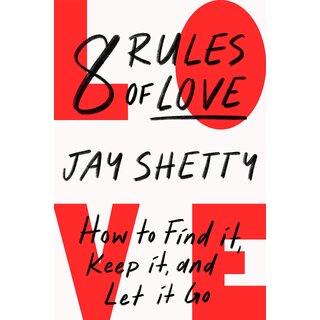
8 Rules of Love How to Find it, Keep it, and Let it Go by Jay Shetty (English, Paperback)
Quick Overview
The author of the #1 New York Times bestseller Think Like a Monk offers a revelatory guide to every stage of romance, drawing on ancient wisdom and new science.
Nobody sits us down and teaches us how to love. So we’re often thrown into relationships with nothing but romance movies and pop culture to help us muddle through. Until now.
Instead of presenting love as an ethereal concept or a collection of cliches, Jay Shetty lays out specific, actionable steps to help you develop the skills to practice and nurture love better than ever before. He shares insights on how to win or lose together, how to define love, and why you don’t break in a break-up. Inspired by Vedic wisdom and modern science, he tackles the entire relationship cycle, from first dates to moving in together to breaking up and starting over. And he shows us how to avoid falling for false promises and unfulfilling partners.
By living Jay Shetty’s eight rules, we can all love ourselves, our partner, and the world better than we ever thought possible.
Review
About the Author
Author Jay Shetty aims to elevate us from the negativity, anxiety, and hopelessness of today’s
world in his book THINK LIKE A MONK: Train Your Mind for Peace and Purpose Every Day, to be
published by Simon and Schuster on April 14. Drawing on both Jay’s experience as a monk in a
Hindu ashram and his post-monk life as an influential thinker and spiritual guide, Think Like a
Monk distills monk wisdom into practical, everyday steps anyone can take to live a less anxious,
more meaningful life.
How can we transform our experience of life today? Jay says, “When I trained as a monk, I
found that monks are able to remain centered and calm amid all the chaos that life throws at
us. Monks are the absolute experts in mastering their minds. I wrote THINK LIKE A MONK in
order to help everyone access the same mindset, the same thinking patterns, the same
processes that help monks find peace, balance, and purpose.”
Like his monk teachers, Jay draws from the Bhagavad Gita, a sacred Indian text based on the
Upanishads, writings from around 800-400 BCE. In a world where people are constantly looking
for answers, Jay believes the wisdom for how to find peace and purpose has been here all
along.
